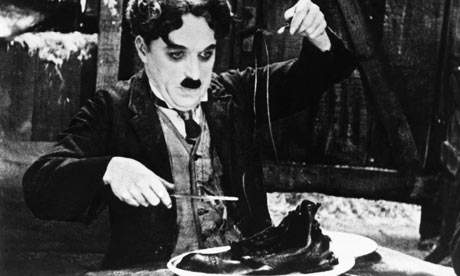 Funny old sole … Charlie Chaplin eats a shoe in the 1925 film The Gold Rush. Photograph: Bettmann/Corbis
Funny old sole … Charlie Chaplin eats a shoe in the 1925 film The Gold Rush. Photograph: Bettmann/Corbis
We all have our blind spots, and Lord knows I’ve got mine: ratatouille (the food not the movie), the Glastonbury festival. In film, though, there is one particular personal bugaboo that’s always stood out above all others – an icon beloved down the ages, a fixture in both the canon and the bosom of popular culture, a 24-carat genius about who I have seldom felt anything but the deepest and most profound indifference. Here goes: I have never liked Charlie Chaplin. And I now I think I may have been wrong.
For the sake of context, one of the periodic mini-surges of interest in Kennington Road’s favourite son is under way at the moment, with The Circus enjoying a well-received theatrical re-release in the US, and a string of DVD re-issues here. But first things first, perhaps. I should go back to the beginning here, because for the record alone it needs making clear that my aversion to Chaplin wasn’t and isn’t some kind of contrarian posture, cooked up in my 30s to cock a snook at conventional wisdom. No, I assure you, even as a kid I couldn’t stand him.
Odd, pallid child that I was, where my peers immersed themselves in Marvel comics or Dr Who, I gravitated to old slapstick; a strange taste for a 10-year-old perhaps, but one I developed with just as much ferocious tribalism as boys that age always muster up, and worked out what I liked, and just as importantly, what I didn’t. In the first camp were Buster Keaton, revered by me then as now, and the Marx brothers, crazed children in the guise of grown-ups, and, as such, instant heroes. But Chaplin? Creepy, twee Chaplin, with that creepy, twee walk, every joke so painfully contrived even a 10-year-old could see every punchline waddling over the horizon? As a boy, every time the moustache and bowler turned up on the TV in my mum’s front room, my face would turn to thunder. I’d have taken Laurel and Hardy instead every time; you wouldn’t have had to hold a gun to my irritatingly precocious head to make me admit to even preferring Harold Lloyd.
Then, in later life, I started trying to get myself educated in movies. The more I saw of Kurosawa and Ray and Welles and so on, the more I found, if not always flat-out pleasure (though there was plenty of that), at least regular moments of genuine awe. But Chaplin was still a problem. Now, although I dutifully took in his landmark films, it appeared that hardly anyone agreed with me about him – that where I continued to see glutinous, creaky sentimentality, I was meant to be appreciating another legend. And what made it worse was that I could see that historically here was something of huge importance; I just felt nothing at all watching it.
So, as the years rolled by, what began as lack of interest hardened into outright dislike. For my whole adult life, whenever I came across Chaplin, I thought only of endless rows of Little Tramp plastic figurines and the overrated Robert Downey Jr biopic. Until, that is, came the slow realisation that I might have been mistaken. The triggers, sadly predictably, were YouTube snippets dug up for various bits of research; then, my alarm bells ringing, I went back to the classics – starting with Modern Times, the free-swinging assault on the evils of industrial capitalism that I hadn’t seen since my teens, and which now I found, first to my chagrin and then my exhilaration, to be everything I’d always seen it described as: humane, wildly innovative and relentlessly funny.
It was, belatedly, only the start. In recent months, even before the latest round of re-releases, I’ve been furtively re-acquainting myself with all things Chaplin. And the results – well, the gags still feel contrived, of course, just as all great film comedy is, Keaton included (I can hardly believe I’m saying it, but for choreographed hilarity the opening of Modern Times almost equals The General). Despite the primitivism of the era, his direction is often unbelievably graceful (check out the massed prospectors setting out in The Gold Rush). And even the heavy sentiment of The Kid or City Lights now just feels like a product of its viciously hard times (and in hard times like our own, it makes a certain sense to be re-discovering him now). All told, I’ll just have to admit the joke was on me all along – although you’ll still never get me going to Glastonbury.